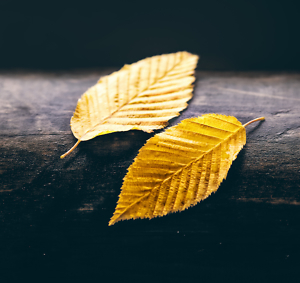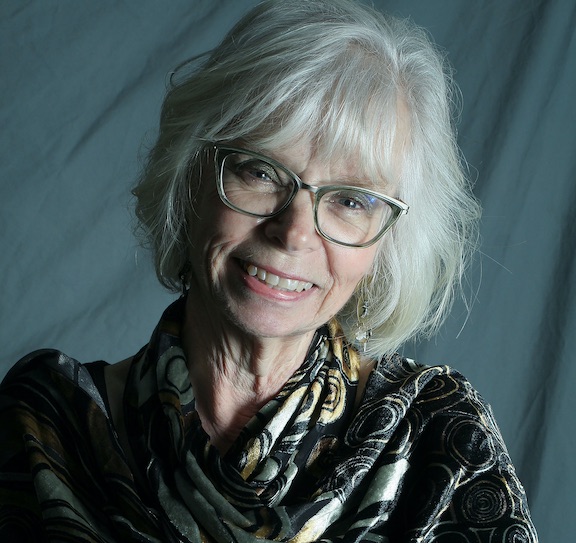Fall Diptych
Meditations on a season

My body, the portrait I show the world—soft tissue, muscle, bone large and small, also my knobby scaffold—kneecap, knuckle, elbow—the elbow that lets me stand akimbo, a word not used much anymore. That lets my torso open and fold, winglike. The machinery of dailiness I believe will remain upright, until weeding in late August, a hidden pathway of swirled Crab Orchard stone. What rampaged in summer’s furnace — pennywort, stonecrop, creeping Jenny — I grab by the handful, my shinbone the opposing fulcrum. But taming the mane of climbing hydrangea on the arbor needs steps, the wooden kind. What happens next I’ve told no one, not my daughters or friends, not my neighbor, the closest I could’ve called had I cracked anything akimbo. Flat on my back, the stool having slipped on flagstone, grateful my ample ass cushioned the fall, a cloth hat cradled my head. I’ve fallen hard before, mostly in love with the idea of love, as the song goes: Falling in love with love is falling for make believe. Hard as the shock of unforgiving rock at my spine, the sudden here then gone. Hard as the ending of those loves, leaving me emptyhanded in the thicket of grief and regret. Though love runs truest and longest when we fall head over heels first with ourselves. We must fill the vessel from within before emptying it on others: a genuine self-love that says I am complete on the sometimes shaky earth, a love that lays the groundwork for every joy with another. Sprawled on the path, wonder of wonders, nothing was broken, no hairline fracture or obvious wound, though my elbow still zings when I bump it months later. The worst could’ve happened, but by the grace of the garden goddess hovering nearby, suspending me in time and space, it didn’t. It didn’t because this body has faced the hardest tumbles of winters past. Because I’ve slogged through slippage and breakage to rearrange my angles upright again, for and by myself, to stand on the back stoop these welcome, airish mornings and breathe in the coming fall.
***
This will be the year, I tell myself. This fall I’ll notice the one gloaming in September when it stops. When summer’s cicada chorale no longer screams, rasps, soars, falls in the trees, seemingly in every crack and crevice, every petal and weed, rattling my head and hearing. When the silence left in their absence is so deafening, I’ll finally notice the stopping just as I wait each June for them to start. The starting goes way back, to my grandmother’s porch, the creak of the glider as we sat breaking beans to the rachet and rhythm of jarflies, as we called them then, emerging from the ground I most called home, a tumble-down street in east Nashville. I would soon leave that place, crossing the Cumberland Plateau to East Tennessee to live with my father, my own reemergence to steadier ground. But leaving my mother and my maternal fold behind was a fall from grace I’m only now shedding, in my later years, like the cicadas’ wet exoskeleton, to be reborn in the canopy, an ecstasy of coupling and mating. As a girl on that porch, I couldn’t know those periodic voices, that quickening for the one true love amid hundreds, would forever imprint my memory, my Pavlovian response. These days, their fullheartedness arcs earlier and earlier, once near the summer solstice, now with warming weather, a week or more before that still point of light and night. They mark my own time ebbing away, falling into the start of my seventies. Every year, they spend themselves in the top branches, the seeds of their sons and daughters burrowing down until the next exhalation. I want to mark their passage back to the common earth, but there are pumpkins to buy and arrange, butternut squash to store on the attic stairs, sweet potatoes to dig and season, seedheads to cut after goldfinch take their fill, the gardens to bed before first frost. We can never know the end of anything. The last time my grandmother waved to me as I hurried home to beat the dark, the last time her hands were caked with biscuit dough, all of the times when and when before her mind slammed shut in dementia — when was that? When did the half-full vessel become half-empty? Outside, nearing dusk, a few stragglers lull me into false song — then, when my back is turned, silence. I want to rewind time, prick my ears to the one evening summer ends, catch its last gold to oil that rusting glider. I want to notice the moment everything changes, like the subtle shift in daylight, when what was impossibly bright is now a smaller, deeper dark coming on. When I pull into myself with tea and extra covers and feel the bittersweet drop of leaves as if I’m the one shrinking, no longer becoming. As if my own body’s tune leans forward on the stoop holding its breath.

Copyright © 2022 by Linda Parsons, All rights reserved. Poet, playwright, essayist, and editor, Linda Parsons is the poetry editor for Madville Publishing and the copy editor for Chapter 16. Her sixth poetry collection, Valediction, is forthcoming in 2023. Five of her plays have been produced by Flying Anvil Theatre in Knoxville, where she lives and gardens. She is an eighth-generation Tennessean.

